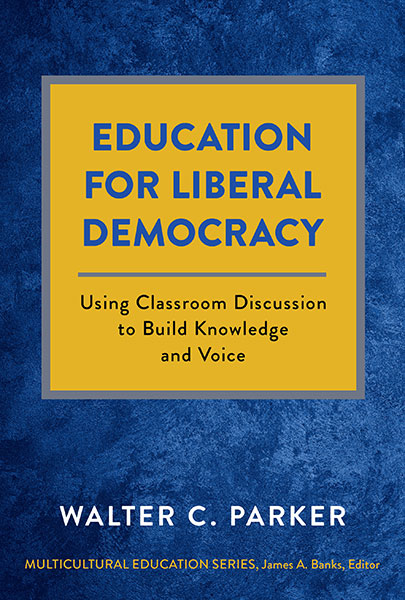Professors: Request an Exam Copy
Print copies available for US orders only. For orders outside the US, see our international distributors.
Publication Date: April 28, 2023
Pages: 224
Series: Multicultural Education Series

Our democracy is in crisis. Both political trust and a shared standard of truth are broken. In this book, Walter Parker shows why and how civic education can help. Offering a centrist approach suitable for a polarized society, Parker focuses on two linked curriculum objectives: disciplinary knowledge and voice. He illustrates how classroom discussion, alongside concept formation and deep reading, expand students’ minds while developing their ability to speak with others and form opinions. When children come to school, they emerge from the private chrysalis of babyhood and kin to interact with a diverse student body along with teachers, curriculum, instruction, and the school’s unique mission: education. Parker argues that these assets make school the ideal place to teach young people the liberal arts of studying and discussing public issues and academic controversies, both in and beyond school. The chapters in this collection, spanning 20 years and coming from one of civic education’s most influential scholars, show that voice can be taught right alongside disciplinary knowledge. Drawing students into dialogue with one another on the curriculum’s central questions is a teacher’s most ambitious goal and, when it happens, teaching’s greatest accomplishment.
Book Features:
Walter C. Parker is professor emeritus of social studies education at the University of Washington, a member of the National Academy of Education, a fellow of the American Educational Research Association, and author of Teaching Democracy: Unity and Diversity in Public Life.
“Walter C. Parker interweaves political philosophy and pedagogy to present a deep and useful primer for building a liberal democracy through civic education.”
—Theory and Research in Education
“This is a clear, vitally important, and beautifully written book. In these often-troubling times, not only does Walter Parker make a powerful case for liberal democracy, he does so while giving civic educators the tools they need to effectively advance that ideal.”
—Joseph Kahne, Ted and Jo Dutton Presidential Professor for Education Policy and Politics, University of California, Riverside
“There is probably no more difficult and yet necessary moment in which to teach civics. An antidote to the shouting past each other and a resistance to deliberative discussion, Education for Liberal Democracy searches for a way to create the imagined community that democracy promises.”
—Gloria Ladson-Billings, professor emerita, University of Wisconsin–Madison
“Walter Parker is truly one of the leading lights in civic education in the 20th and 21st centuries. His trademark combination of rigorous scholarship and practical, try-tomorrow teaching advice has supported educators worldwide in creating classrooms and curricula that foster liberal democracy, even under trying circumstances. This thought-provoking, eminently useful, and conceptually, politically, and pedagogically sophisticated book could not be more timely. It should be read by all educators who care about the future of liberal democracy.”
—Meira Levinson, Juliana W. and William Foss Thompson Professor of Education and Society, Harvard University
“Walter Parker’s Education for Liberal Democracy puts forward a well-argued proposal for a new approach to civic education that is highly engaging, original, interesting, and possible. This is an important book that will be especially interesting to people—both in and out of schools—who are concerned about the sorry state of the contemporary political culture and hope that schools can play a role in building a healthier democracy.”
—Diana E. Hess, dean, School of Education, University of Wisconsin–Madison
Contents (Tentative)
Foreword, by James A. Banks
Preface
Acknowledgments
Part I: A Centrist Approach to Civic Education
1. Introduction
Liberal and Illiberal Democracy
Knowledge and Voice
Curriculum and Instruction
An Autobiographical Note
Overview of Chapters
Conclusion
2. Teaching Academic Controversies
Cooperative Learning and SAC
The Revised Model
Conclusion
3. Teaching Against Idiocy
Dodging Puberty
Schools and Idiocy
Schools Are Public Places
Three Keys
The Social Curriculum
The Academic Curriculum
The Three Rs?
Part II: Toward Deeper Civic Learning
4. Concept Development
Teaching and Learning Concepts
Classifying
Some Examples
Conclusion
5. Reinventing the High School Government Course
Method and Design Principles
Curriculum
Discussion
Conclusion
6. Listening to Strangers
Seminar and Deliberation
Listening to Strangers
Political Friendship
Listening to Strangers at School
Practices of Listening to Strangers
Conclusion
7. What Is Justice?
Just Individuals
Just Societies
Cutting Through Conventional Wisdom
Conclusion
Part III: Global Civic Education
8. Educating World Citizens
National Security
Marginal Voices
A Solution on the Loose
9. Human Rights Education’s Curriculum Problem
Problem: Access to What?
Solution: Toward an Episteme for HRE
Conclusion
10. The Right to Have Rights
A Curriculum Proposal
Rationale
The Immigrant Labor Paradox
Classroom Activities
Instructional Supports
Conclusion
11. Afterword: Cultivating Judgment
Classroom Discussion
Uncoerced Decisions
The Social Studies
Conclusion
Endnotes
References
Index
About the Author
Professors: Request an Exam Copy
Print copies available for US orders only. For orders outside the US, see our international distributors.